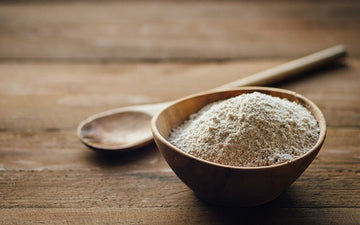
Do you want to get important proteins and nutrients in your diet, in a convenient way? Are you an active person? Conscious of what goes in your body and your impact on the environment? If you answered yes to any of the previous questions, then vegan protein powder could be a useful addition to your nutrition plan.
Protein is vital for life; it maintains bodily and cellular functions. Protein contains amino acids (the building blocks for protein) that cannot be created by our bodies and we have no reserves of protein, meaning it must be consumed every day. If we have active lifestyles, then this will increase our protein needs. A boost in daily protein intake is a great first step to support overall health. Personally, I’ve found that having more plant-based protein in my diet has meant that my energy levels are consistent and that I don’t get that sudden, all-consuming hunger.
Protein powders are a convenient way to boost our daily protein intake. The ever-growing list of options can be overwhelming! However, plant-based protein powder is one option that most of us could benefit from. Vegan protein powder is derived from various types of plants. The best vegan protein powders will combine plant-based proteins, such as brown rice and pea, to ensure that they complement one another, containing high levels of essential amino acids and have a high protein content (1).
Exercise effectiveness
A study comparing pea protein to whey protein, demonstrated similar increases in muscle thickness, strength, force production, body composition and workout of the day performance (2). Soy protein has been comparable to whey protein in terms of muscle growth and strength development (3). Similarly, there was no difference between brown rice and whey protein powder when comparing body composition and exercise performance (4).
Health benefits
Plant-based diets typically reduce the risk of developing numerous chronic diseases over the lifespan (5). Specifically, including more plant sources of protein compared to animal-based protein reduces the risk of cardiovascular disease (6). Research has found that replacing animal proteins with plant protein sources increased fibre intake and improved the quality of dietary fat (7).
Vitamins and minerals
Plant-based protein products contain a wide range of nutrients, for example, pea-based protein products are a source of calcium, iron, phosphorus and zinc (8)
Dairy-free
Cow dairy is one of the most common food sensitivities. Dairy-based foods, such as milk and yoghurt, are rich sources of protein; those going dairy-free usually need to supplement with extra protein (7).
Digestibility
Protein digestibility indicates the proportion of ingested amino acids that can be made available for utilisation by the body after digestion and absorption. Pea (83-90%) and soy (95-98%) proteins have a similar digestibility to milk (84-94%), although whey protein (98-100%) has higher digestibility (9). However, when plant proteins are consumed in appropriate combinations, then they could be complementary (1,9). Hero Nutrition’s Perform + Recover, aids and boosts your natural digestion by including the enzymes papain and bromelian (10, 11, 12).
Environment
Our dietary habits and the environmental impact are inseparable, so integrating our health and sustainability goals are favourable. An organic, vegetarian diet was found to be associated with lower environmental impacts (13). In particular, producing plant-based protein requires less land, water and energy compared to producing animal protein (5).
Plant-based protein powders are convenient and they offer specific health benefits whilst performing comparably to animal-based protein. As with any supplement or product that you use regularly, start by prioritising quality and sourcing above anything else to ensure that what is on the label is actually in the container. Then, aim to choose plant-based protein powder that is not only a rich source of all nine essential amino acids, but also that are low allergen and soy-free and naturally flavoured and sweetened, such as our Performance Protein + Superfood Blend, which is a brown rice and pea protein blend, packed with additional superfoods.
Sources:
- https://www.ncbi.nlm.nih.gov/pmc/articles/PMC6245118/
- https://pubmed.ncbi.nlm.nih.gov/25628520/ https://www.ncbi.nlm.nih.gov/pmc/articles/PMC6358922/
- https://www.ncbi.nlm.nih.gov/pmc/articles/PMC7312446/
- https://www.ncbi.nlm.nih.gov/pmc/articles/PMC3698202/
- https://www.ncbi.nlm.nih.gov/pmc/articles/PMC6316289/
- https://academic.oup.com/advances/article/6/6/712/4555152
- https://www.mdpi.com/2072-6643/12/4/943/htm
- https://www.sciencedirect.com/science/article/pii/S0889157521005329
- https://www.sciencedirect.com/science/article/pii/S2666154321001678#bib10
- https://www.academia.edu/8832171/PAPAIN_A_PLANT_ENZYME_OF_BIOLOGICAL_IMPORTANCE_A_REVIEW?from=cover_page
- https://downloads.hindawi.com/archive/2012/976203.pdf
- https://www.spandidos-publications.com/br/5/3/283
- https://www.frontiersin.org/articles/10.3389/fnut.2018.00008/full?utm_source=G-PRS&utm_medium=WEXT&utm_campaign=ECO_FNUT_20180205_organic-food&setLang=true





